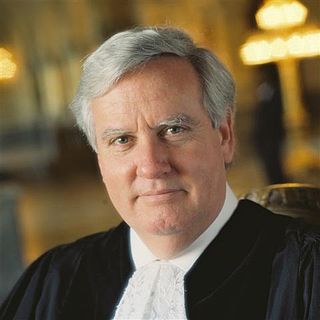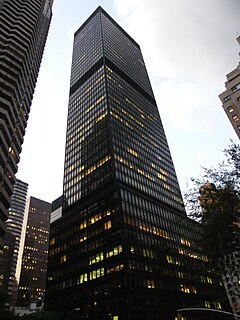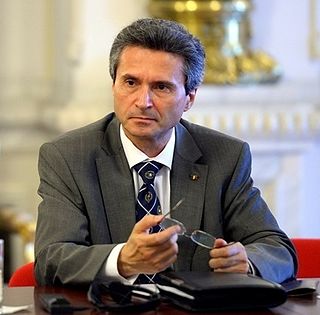
Cameroon's noncontentious, low-profile approach to foreign relations puts it squarely in the middle of other African and developing country states on major issues. It supports the principles of non-interference in the affairs of third world countries and increased assistance to underdeveloped countries. Cameroon is an active participant in the United Nations, where its voting record demonstrates its commitment to causes that include international peacekeeping, the rule of law, environmental protection, and Third World economic development. In the UN and other human rights fora, Cameroon's non-confrontational approach has generally led it to avoid criticizing other countries.

The United Nations (UN) is an intergovernmental organization whose purposes are to maintain international peace and security, develop friendly relations among nations, achieve international cooperation, and be a centre for harmonizing the actions of nations. It is the world's largest and most familiar international organization. The UN is headquartered on international territory in New York City, and has other main offices in Geneva, Nairobi, Vienna, and The Hague.

The United Nations Security Council (UNSC) is one of the six principal organs of the United Nations (UN) and is charged with ensuring international peace and security, recommending the admission of new UN members to the General Assembly, and approving any changes to the UN Charter. Its powers include establishing peacekeeping operations, enacting international sanctions, and authorizing military action. The UNSC is the only UN body with the authority to issue binding resolutions on member states.
Canada was a founding member of the United Nations, and was an original signatory of the Declaration by United Nations. At the signing of the Declaration by United Nations, Canada was one of four Dominions of the British Empire present, alongside Australia, New Zealand, and the Union of South Africa. In 1945, Canada was present at the United Nations Conference on International Organization and signed the Charter of the United Nations. McGill University professor John Peters Humphrey was the principal author of the first draft of the Universal Declaration of Human Rights.
Peter Tomka is a Slovak judge of the International Court of Justice. Prior to his election to the ICJ in 2003, Tomka was a Slovak diplomat.

Reform of the United Nations Security Council (UNSC) encompasses five key issues: categories of membership, the question of the veto held by the five permanent members, regional representation, the size of an enlarged Council and its working methods, and the Security Council-General Assembly relationship. The Member States, regional groups and other Member State interest groupings developed different positions and proposals on how to move forward on this contested issue.

Sir Christopher John Greenwood is Master of Magdalene College, Cambridge and a former British judge at the International Court of Justice. Prior to his election, he was professor of international law at the London School of Economics and a barrister who regularly appeared as counsel before the International Court of Justice, the European Court of Human Rights, the English courts, and other tribunals.

The United Kingdom is a founding member of the United Nations and one of five permanent members of the UN Security Council.

France has contributed to the organisation over the years through its leadership and sponsorship of various resolutions and other major UN bodies as well as being one of the largest-contributing states to both the general budget and to the peacekeeping operations budget. Several French Presidents have openly spoken of their support for the UN and its aims and there are clear links between France’s own policies and the values which the UN espouses, particularly concerning human rights. In the last decade, France has called for, proposed and supported various reforms on the UNSC and their Peacekeeping Operations (PKO). The UN, since its foundation, represents the core of France’s engagement with the multilateral international system.
Brazil is a founding member of the United Nations and participates in all of its specialized agencies. Brazil is among the twenty top contributors to United Nations peacekeeping operations, and has participated in peacekeeping efforts in the Middle East, the former Belgian Congo, Cyprus, Mozambique, Angola, and more recently East Timor and Haiti. Brazil has been regularly elected as a non-permanent member to the Security Council since its first session in 1946 and is now among the most elected UN member states to the UNSC. Brazil was voted to become a member of the 15-country UN Security Council for a two-year term, in 2022-23.

New Zealand is a founding member of the United Nations, having taken part in 1945 in the United Nations Conference on International Organization in San Francisco.
Luis Padilla Nervo was a Mexican politician and diplomat. He was the first Mexican Ambassador at the United Nations, Minister of Foreign Affairs and President of the Sixth Session of United Nations General Assembly.
India was among the charter members of the United Nations that signed the Declaration by United Nations at Washington, D.C. on 1 January 1942 and also participated in the United Nations Conference on International Organization at San Francisco from 25 April to 26 June 1945. As a founding member of the United Nations, India strongly supports the purposes and principles of the UN and has made significant contributions in implementing the goals of the Charter, and the evolution of the UN's specialised programmes and agencies.

The Permanent Mission of France to the United Nations is the diplomatic mission of the French Republic to the United Nations in New York. As such, it reports to the Ministry of Foreign and European Affairs.

Ion Jinga is a Romanian diplomat working in the Romanian Ministry of Foreign Affairs since 1992. Between 9 April 2003 and 7 March 2008 he served as the Romanian Ambassador to the Kingdom of Belgium and between 7 March 2008 and 4 August 2015 he held the position of Ambassador of Romania to the United Kingdom of Great Britain and Northern Ireland. On 4 August 2015, he started his term as Ambassador extraordinary and plenipotentiary, Permanent Representative of Romania to the United Nations in New York. He and his wife Daniela have one daughter, Daria.
Malaysia became the 82nd member of the United Nations on 17 September 1957. Malaysia has held a rotational non-permanent seat on the United Nations Security Council for four terms, and has participated in over 30 United Nations peacekeeping missions since October 1960.
Ukraine was one of the founding members of the United Nations when it joined in 1945 as the Ukrainian Soviet Socialist Republic; along with the Byelorussian Soviet Socialist Republic, Ukraine signed the United Nations Charter when it was part of the Soviet Union. After the dissolution of the Soviet Union in 1991, the newly independent Ukraine retained its seat.

The Permanent Mission of Mexico to the United Nations is the diplomatic mission of Mexico to the United Nations in New York. The Mission is represented by the Permanent Representative. The current Mexican Permanent Representative to the United Nations is Juan Ramón de la Fuente.

The Permanent Representative of Romania to the United Nations is currently Ion Jinga since 4 August 2015. Romania joined the United Nations (UN) on 14 December 1955.
The Republic of Türkiye is one of the 51 founding members of the United Nations when it signed the United Nations Conference on International Organization in 1945.














